|
Most equity indexes advanced last week. Investors focused primarily on earnings, but the situation with Greece continued to lurk in the background. Investors briefly celebrated the People's Bank of China's reduction in its bank reserve requirements as a response to slowing growth in the country. Both the Nikkei and Nasdaq revisited highs not seen since 2000. On the week, gains ranged from 0.3 percent (S&P/TSX) to 3.6 percent (Taiex). The STI was down 0.3 percent, the SET declined 0.7 percent and the Sensex lost 3.5 percent.
Flash PMIs show slippage
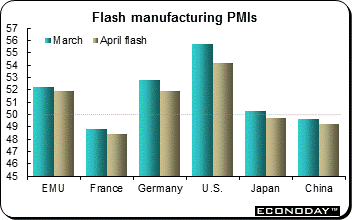 Flash manufacturing purchasing managers' indexes disappointed. Japan, China, France, Germany and the U.S. all had PMI reports that were lower than the month before. And Japan, China and France had readings below 50, signifying contraction. It is a continuation of a 2015 downward trend for Japan and China, a continuation of sub-50 numbers for France, and a reversal for Germany and the U.S. — both had been producing healthy readings so far this year. Flash manufacturing purchasing managers' indexes disappointed. Japan, China, France, Germany and the U.S. all had PMI reports that were lower than the month before. And Japan, China and France had readings below 50, signifying contraction. It is a continuation of a 2015 downward trend for Japan and China, a continuation of sub-50 numbers for France, and a reversal for Germany and the U.S. — both had been producing healthy readings so far this year.
Following a good March, Eurozone's composite PMI (manufacturing and services) declined from 54 to 53.5 in April. The relative decline over time in manufacturing across the Eurozone is evident (51.9), while services stand at 53.7. PMIs for France and Germany were lower in all accounts. German composite index went from 55.4 to 54.2 (services from 55.4 to 54.4 and manufacturing from 52.8 to 51.9). The French composite PMI declined from 51.5 to 50.2 with both services (52.4 to 50.8) and manufacturing (48.8 to 48.4) slowing down. France continues to struggle to sustain growth.
The flash PMIs for Japan, China and the U.S. are for manufacturing only. The readings for Japan and China were below the 50 breakeven point between expansion and contraction. The U.S. reading eased to 54.2 from 55.7, but remained at a relatively robust level of growth. April's manufacturing PMI for Japan slipped to 49.7 from 50.4. For China, the contractionary reading deteriorated to 49.2 after March's 49.6.
|
|
2014 |
2015 |
% Change |
|
Index |
Dec 31 |
Apr 17 |
Apr 24 |
Week |
2015 |
| Asia/Pacific |
|
|
|
|
|
|
| Australia |
All Ordinaries |
5388.6 |
5851.5 |
5906.8 |
0.9% |
9.6% |
| Japan |
Nikkei 225 |
17450.8 |
19652.9 |
20020.0 |
1.9% |
14.7% |
| Hong Kong |
Hang Seng |
23605.0 |
27653.1 |
28061.0 |
1.5% |
18.9% |
| S. Korea |
Kospi |
1915.6 |
2143.5 |
2159.8 |
0.8% |
12.7% |
| Singapore |
STI |
3365.2 |
3525.2 |
3513.0 |
-0.3% |
4.4% |
| China |
Shanghai Composite |
3234.7 |
4287.3 |
4393.7 |
2.5% |
35.8% |
|
|
|
|
|
|
|
| India |
Sensex 30 |
27499.4 |
28442.1 |
27437.9 |
-3.5% |
-0.2% |
| Indonesia |
Jakarta Composite |
5227.0 |
5410.6 |
5435.4 |
0.5% |
4.0% |
| Malaysia |
KLCI |
1761.3 |
1845.9 |
1862.6 |
0.9% |
5.8% |
| Philippines |
PSEi |
7230.6 |
7946.9 |
7947.25 |
0.0% |
9.9% |
| Taiwan |
Taiex |
9307.3 |
9570.9 |
9913.3 |
3.6% |
6.5% |
| Thailand |
SET |
1497.7 |
1566.9 |
1555.5 |
-0.7% |
3.9% |
|
|
|
|
|
|
|
| Europe |
|
|
|
|
|
|
| UK |
FTSE 100 |
6566.1 |
6994.6 |
7070.7 |
1.1% |
7.7% |
| France |
CAC |
4272.8 |
5143.3 |
5201.5 |
1.1% |
21.7% |
| Germany |
XETRA DAX |
9805.6 |
11688.7 |
11810.9 |
1.0% |
20.5% |
| Italy |
FTSE MIB |
19012.0 |
23044.1 |
23427.4 |
1.7% |
23.2% |
| Spain |
IBEX 35 |
10279.5 |
11359.4 |
11505.4 |
1.3% |
11.9% |
| Sweden |
OMX Stockholm 30 |
1464.6 |
1655.7 |
1698.5 |
2.6% |
16.0% |
| Switzerland |
SMI |
8983.4 |
9245.9 |
9302.1 |
0.6% |
3.5% |
|
|
|
|
|
|
|
| North America |
|
|
|
|
|
|
| United States |
Dow |
17823.1 |
17826.3 |
18080.1 |
1.4% |
1.4% |
|
NASDAQ |
4736.1 |
4931.8 |
5092.1 |
3.2% |
7.5% |
|
S&P 500 |
2058.9 |
2081.2 |
2117.7 |
1.8% |
2.9% |
| Canada |
S&P/TSX Comp. |
14632.4 |
15360.6 |
15408.3 |
0.3% |
5.3% |
| Mexico |
Bolsa |
43145.7 |
45012.4 |
45773.3 |
1.7% |
6.1% |
 Equities advanced in a week of mixed earnings reports and little economic data. Early optimism for a solution to the Greek debt problem soured after a meeting of Eurozone finance ministers in Latvia ended without a deal. Discussions will continue at the next Eurogroup meeting on May 11. The FTSE, CAC and DAX each added 1.1 percent while the SMI was 0.6 percent higher. Equities advanced in a week of mixed earnings reports and little economic data. Early optimism for a solution to the Greek debt problem soured after a meeting of Eurozone finance ministers in Latvia ended without a deal. Discussions will continue at the next Eurogroup meeting on May 11. The FTSE, CAC and DAX each added 1.1 percent while the SMI was 0.6 percent higher.
The British election is near at hand on May 7. Prime Minister David Cameron's center right Conservatives and the center left Labour party are neck and neck in opinion polls, indicating that no single party will win a clear majority. However, London markets have remained calm thus far despite the uncertainty with the FTSE near an all-time high and the pound sterling rising.
At a Friday meeting in Riga, Latvia, Eurozone finance ministers said that Greece will not get more aid until it agrees to a complete economic reform plan. Some Eurozone finance ministers sharply criticized the Greek government for moving too slowly on steps to overhaul the country's economy that they said are necessary to get debt relief and to avoid a default. The acrimony was one of the strongest signs yet of rising concerns about the economic situation in Greece and the commitment of the country's finance minister, Yanis Varoufakis, to address it.
Jeroen Dijsselbloem, the Dutch finance minister who chairs the Eurogroup of his Eurozone colleagues, said an agreement with Athens to free up bailout aid remained distant after a meeting that officials said was heated. Officials said frustration with the slow pace of the talks boiled over inside the closed door meeting between all 19 Eurozone ministers including Greece's Yanis Varoufakis.
Chairman Dijsselbloem said there were still wide differences to cover and to bridge with Greek authorities and funds will not be disbursed without a comprehensive deal. "Time is running out," he told at the press conference following the meeting. Too much time has been lost in the past two months. Greek banks can tap into emergency liquidity as long as they remain solvent, European Central Bank President Mario Draghi said. However, Draghi pointed out that higher yields caused by the lingering uncertainty were eroding the value of the collateral that banks offer in return for loans.
Markets had been decidedly higher in early trading Friday on optimism for a Greek debt deal at the meeting and strong German business confidence data. The markets pared their gains after the meeting concluded without an agreement. Discussions will continue at the next Eurogroup meeting on May 11.
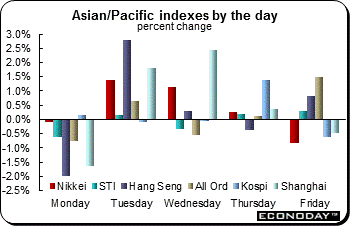 Equities were mixed last week. With a dearth of new economic data, investors focused on U.S. earnings reports. The Shanghai Composite (up 2.5 percent) continued to reach new heights while the Nikkei (up 1.9 percent) climbed to a level not seen since 2000. However, going in the other direction was the Sensex — it lost 3.5 percent on the week as it declined four of five days. The Taiex added 3.6 percent on the week on hopes of a possible launch of a stock trading link between Taiwan and Shanghai pushed shares higher. A similar program between Shanghai and Hong Kong last year has at different points spurred a rally in both markets. Equities were mixed last week. With a dearth of new economic data, investors focused on U.S. earnings reports. The Shanghai Composite (up 2.5 percent) continued to reach new heights while the Nikkei (up 1.9 percent) climbed to a level not seen since 2000. However, going in the other direction was the Sensex — it lost 3.5 percent on the week as it declined four of five days. The Taiex added 3.6 percent on the week on hopes of a possible launch of a stock trading link between Taiwan and Shanghai pushed shares higher. A similar program between Shanghai and Hong Kong last year has at different points spurred a rally in both markets.
The most influential event for regional investors was the People's Bank of China's decision on April 20 to free up cash held by banks by lowering the bank reserve requirement ratio (RRR) by 100 basis points to 18.5 percent in an effort to stimulate the economy. The move followed the release of first quarter gross domestic product data that indicated China grew at its slowest pace since 2009. This was followed by the flash manufacturing PMI for April — this reading, in contractionary territory, dropped to a 12-month low.
The Nikkei closed above 20,000 Wednesday for the first time since 2000. The year's rally has been driven not only by international exporters but also by lesser known companies selling staples domestically. Many investors are cautious whether the Nikkei is poised for further gains. Japanese economic growth remains weak and China's economy has slowed. Much of the buying in the Tokyo stock market is coming from the government pension fund and other public or quasi-public investors, rather than individuals.
Will it (or won't it) lower its key interest rate' That is the question swirling around the Reserve Bank of Australia. Analysts were disappointed that the RBA kept its key interest rate at 2.25 percent when the Board met the first week of April. Attention now has shifted to its May 5 meeting. The RBA, in its minutes for the April meeting, noted that the Board was waiting for more data, including the first quarter consumer price index.
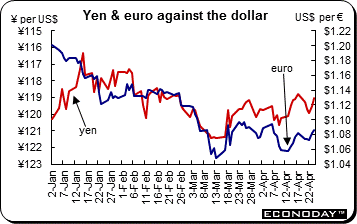 The U.S. dollar weakened last week, declining in value against the euro, pound sterling and the Canadian and Australian dollars. However, it did gain against the yen and Swiss franc. The currency was pressured by downbeat economic data which could, in turn, impact a Federal Reserve interest rate decision later this year. The dollar has had a stellar run over the past few months, fueled by expectations that the Fed will raise rates while other central banks around the world are still aggressively easing. Despite the worries about Greece, the euro gained on the week. The U.S. dollar weakened last week, declining in value against the euro, pound sterling and the Canadian and Australian dollars. However, it did gain against the yen and Swiss franc. The currency was pressured by downbeat economic data which could, in turn, impact a Federal Reserve interest rate decision later this year. The dollar has had a stellar run over the past few months, fueled by expectations that the Fed will raise rates while other central banks around the world are still aggressively easing. Despite the worries about Greece, the euro gained on the week.
The strength of the dollar has been hard on U.S. multinationals as recent earnings reports have made clear. Profits have been dented as overseas revenues are worth less when converted back into the U.S. currency. A stronger dollar can also erode the competitiveness of U.S. exporters.
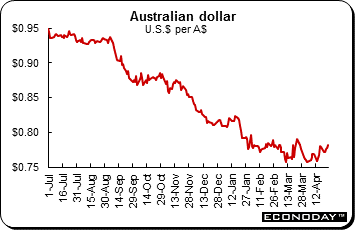 Market watchers expect the Australian dollar to weaken further. Reserve Bank of Australia Governor Glenn Stevens hinted at cash rate cuts Monday, spurring speculation that the RBA could decide on additional monetary easing at its May 5 policy meeting. The Aussie dollar is already at a six year low against its U.S. counterpart, and traders expect the RBA's policy of keeping the country's currency low will push the Australian dollar down further. The currency has been on a long-term downtrend since hitting its high of US$1.10 in 2011. Stevens has repeatedly said that the Australian dollar is still high. In his Monday speech in the U.S., he also said, "The Australian dollar has declined and will very likely fall further yet, over time." Many market watchers believe the RBA is tolerating the Australian dollar's further weakening to make up for the decline in price of iron ore, one of the country's biggest export items. Market watchers expect the Australian dollar to weaken further. Reserve Bank of Australia Governor Glenn Stevens hinted at cash rate cuts Monday, spurring speculation that the RBA could decide on additional monetary easing at its May 5 policy meeting. The Aussie dollar is already at a six year low against its U.S. counterpart, and traders expect the RBA's policy of keeping the country's currency low will push the Australian dollar down further. The currency has been on a long-term downtrend since hitting its high of US$1.10 in 2011. Stevens has repeatedly said that the Australian dollar is still high. In his Monday speech in the U.S., he also said, "The Australian dollar has declined and will very likely fall further yet, over time." Many market watchers believe the RBA is tolerating the Australian dollar's further weakening to make up for the decline in price of iron ore, one of the country's biggest export items.
|
|
2014 |
2015 |
% Change |
|
|
Dec 31 |
April 17 |
April 24 |
Week |
2015 |
| U.S. $ per currency |
|
|
|
|
|
|
| Australia |
A$ |
0.817 |
0.779 |
0.782 |
0.4% |
-4.2% |
| New Zealand |
NZ$ |
0.780 |
0.769 |
0.760 |
-1.2% |
-2.6% |
| Canada |
C$ |
0.861 |
0.818 |
0.821 |
0.3% |
-4.7% |
| Eurozone |
euro (€) |
1.210 |
1.082 |
1.087 |
0.5% |
-10.1% |
| UK |
pound sterling (£) |
1.559 |
1.498 |
1.519 |
1.4% |
-2.5% |
|
|
|
|
|
|
|
| Currency per U.S. $ |
|
|
|
|
|
|
| China |
yuan |
6.206 |
6.198 |
6.195 |
0.1% |
0.2% |
| Hong Kong |
HK$* |
7.755 |
7.752 |
7.750 |
0.0% |
0.1% |
| India |
rupee |
63.044 |
62.365 |
63.563 |
-1.9% |
-0.8% |
| Japan |
yen |
119.820 |
118.800 |
118.990 |
-0.2% |
0.7% |
| Malaysia |
ringgit |
3.497 |
3.624 |
3.580 |
1.2% |
-2.3% |
| Singapore |
Singapore $ |
1.325 |
1.345 |
1.332 |
1.0% |
-0.6% |
| South Korea |
won |
1090.980 |
1083.640 |
1079.530 |
0.4% |
1.1% |
| Taiwan |
Taiwan $ |
31.656 |
31.035 |
30.828 |
0.7% |
2.7% |
| Thailand |
baht |
32.880 |
32.372 |
32.560 |
-0.6% |
1.0% |
| Switzerland |
Swiss franc |
0.9942 |
0.951 |
0.954 |
-0.3% |
4.2% |
| *Pegged to U.S. dollar |
|
|
|
|
|
|
| Source: Bloomberg |
|
|
|
|
|
|
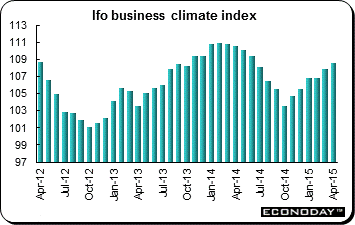 April Ifo business climate index climbed 0.7 points to 108.6, its fifth increase in the last six months and its highest level since June last year. The headline improvement reflected wholly a more positive reading on current conditions as expectations posted a small decline. At 113.9, the current conditions component was up nearly 2 points from March and is at its strongest level since the middle of 2014. However, expectations slipped 0.4 points to 103.5, their first drop since last October but only enough to reverse a part of March's 1.4 point gain. At a sector level, sentiment turned more positive in both manufacturing (14.2 after 12.6) and wholesale (12.7 after 10.1) and also made progress in construction (minus 5.3 after minus 7.7). Retail (2.6 after 5.2) was less optimistic and (unadjusted) morale in services (22.7 after 23.3) similarly deteriorated. April Ifo business climate index climbed 0.7 points to 108.6, its fifth increase in the last six months and its highest level since June last year. The headline improvement reflected wholly a more positive reading on current conditions as expectations posted a small decline. At 113.9, the current conditions component was up nearly 2 points from March and is at its strongest level since the middle of 2014. However, expectations slipped 0.4 points to 103.5, their first drop since last October but only enough to reverse a part of March's 1.4 point gain. At a sector level, sentiment turned more positive in both manufacturing (14.2 after 12.6) and wholesale (12.7 after 10.1) and also made progress in construction (minus 5.3 after minus 7.7). Retail (2.6 after 5.2) was less optimistic and (unadjusted) morale in services (22.7 after 23.3) similarly deteriorated.
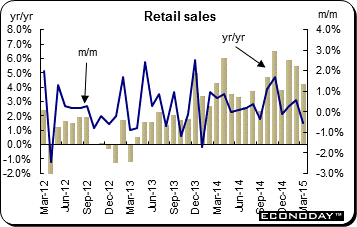 March retail sales volumes dropped 0.5 percent for their first decline since September 2014. Annual growth slowed from 5.4 percent to 4.2 percent, its weakest rate since December. However, the disappointing headline print was essentially attributable to a slump in auto fuel sales which dropped 6.2 percent from February. Excluding this category purchases actually expanded 0.2 percent after a 0.6 percent increase last time. Household goods were up 1.5 percent on the month while clothing & footwear climbed 0.9 percent and non-store retailing 0.6 percent. Still, specialized stores posted a 0.4 percent decline and the other stores category a hefty 1.9 percent reversal. Food sales were up 0.4 percent. March retail sales volumes dropped 0.5 percent for their first decline since September 2014. Annual growth slowed from 5.4 percent to 4.2 percent, its weakest rate since December. However, the disappointing headline print was essentially attributable to a slump in auto fuel sales which dropped 6.2 percent from February. Excluding this category purchases actually expanded 0.2 percent after a 0.6 percent increase last time. Household goods were up 1.5 percent on the month while clothing & footwear climbed 0.9 percent and non-store retailing 0.6 percent. Still, specialized stores posted a 0.4 percent decline and the other stores category a hefty 1.9 percent reversal. Food sales were up 0.4 percent.
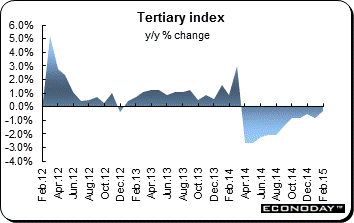 February tertiary industry index increased 0.3 percent on the month and was down 0.3 percent on the year as services continued to be weak in mid-quarter. Among the industries that increased were accommodations, eating & drinking services, real estate & goods rental & leasing, transport & postal activities, scientific research, professional & technical services, finance & insurance and learning support. Miscellaneous services (except government services etc.), wholesale & retail trade, information & communications, medical, health care & welfare, electricity, gas, heat supply & water, living-related & personal services & amusement services and compound services all declined. February tertiary industry index increased 0.3 percent on the month and was down 0.3 percent on the year as services continued to be weak in mid-quarter. Among the industries that increased were accommodations, eating & drinking services, real estate & goods rental & leasing, transport & postal activities, scientific research, professional & technical services, finance & insurance and learning support. Miscellaneous services (except government services etc.), wholesale & retail trade, information & communications, medical, health care & welfare, electricity, gas, heat supply & water, living-related & personal services & amusement services and compound services all declined.
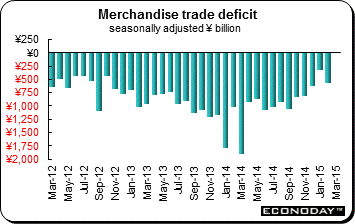 Japan recorded a merchandise trade surplus for the first time in 33 months in March thanks to the weaker yen and cheaper oil. The unadjusted surplus was Y229.3 billion after February's deficit of Y425 billion. Exports were up 8.5 percent on the year while imports sank 14.5 percent. Exports were up for the seventh straight month from a year ago while imports retreated for the third month. The trade deficit for fiscal year 2014 (April 2014 to March 2015) was Y9.134 trillion. Exports to Asia were up 6.7 percent on the year while exports to China increased 3.9 percent. Exports to the U.S. jumped 21.3 percent and to the EU, 9.1 percent. On a seasonally adjusted basis, the surplus in March was Y3.3 billion. Exports were up 3.7 percent on the month while imports declined 5.0 percent. Japan recorded a merchandise trade surplus for the first time in 33 months in March thanks to the weaker yen and cheaper oil. The unadjusted surplus was Y229.3 billion after February's deficit of Y425 billion. Exports were up 8.5 percent on the year while imports sank 14.5 percent. Exports were up for the seventh straight month from a year ago while imports retreated for the third month. The trade deficit for fiscal year 2014 (April 2014 to March 2015) was Y9.134 trillion. Exports to Asia were up 6.7 percent on the year while exports to China increased 3.9 percent. Exports to the U.S. jumped 21.3 percent and to the EU, 9.1 percent. On a seasonally adjusted basis, the surplus in March was Y3.3 billion. Exports were up 3.7 percent on the month while imports declined 5.0 percent.
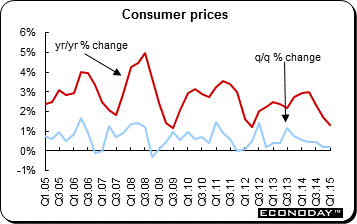 As expected the consumer price index was up 0.2 percent for a second consecutive quarter. When compared with the same quarter a year ago, the CPI was up 1.3 percent after an increase of 1.7 percent in the December 2014 quarter. The most significant price increases this quarter were in domestic holiday travel & accommodation (3.5 percent), tertiary education (5.7 percent) and medical & hospital services (2.2 percent), These increases were partially offset by declines in automotive fuel (down 12.2 percent) and fruit (down 8.0 percent). The decrease in fuel was registered in all fuel types with the quarterly drop the largest since December 2008. Over the 12 months to March 2015, automotive fuel has decreased by 22.5 percent — the largest yearly fall in the history of the series, beginning in September 1973. The RBA's preferred measure of inflation — the trimmed mean which strips out volatile items — was up 0.6 percent and 2.3 percent on the year while the weighted median was up 0.6 percent and 2.4 percent. The increase is well within the inflation comfort zone of the Reserve Bank of Australia whose inflation target is 2 percent to 3 percent. In minutes released earlier this week, the RBA held off a change in the policy rate as they wait for more economic data and especially price data. As expected the consumer price index was up 0.2 percent for a second consecutive quarter. When compared with the same quarter a year ago, the CPI was up 1.3 percent after an increase of 1.7 percent in the December 2014 quarter. The most significant price increases this quarter were in domestic holiday travel & accommodation (3.5 percent), tertiary education (5.7 percent) and medical & hospital services (2.2 percent), These increases were partially offset by declines in automotive fuel (down 12.2 percent) and fruit (down 8.0 percent). The decrease in fuel was registered in all fuel types with the quarterly drop the largest since December 2008. Over the 12 months to March 2015, automotive fuel has decreased by 22.5 percent — the largest yearly fall in the history of the series, beginning in September 1973. The RBA's preferred measure of inflation — the trimmed mean which strips out volatile items — was up 0.6 percent and 2.3 percent on the year while the weighted median was up 0.6 percent and 2.4 percent. The increase is well within the inflation comfort zone of the Reserve Bank of Australia whose inflation target is 2 percent to 3 percent. In minutes released earlier this week, the RBA held off a change in the policy rate as they wait for more economic data and especially price data.
Another Eurogroup meeting passed without a resolution to Greece's debt woes. The discussion continues on May 11 when the Eurogroup meets. Equities were mostly higher despite the Greek concerns and mixed earnings reports. The People's Bank of China's move on April 20 to lower bank reserve requirements in light of weak first quarter growth cheered investors. There was little new economic data.
The Bank of Japan and the Federal Reserve will announce their respective monetary policy decisions mid-week along with the Reserve Bank of New Zealand. Japan reports its major indicators during the week. In Europe, price and unemployment data dominate.
| Central Bank activities |
|
| April 29 |
United States |
Federal Reserve Monetary Policy Announcement |
|
New Zealand |
Reserve Bank of New Zealand Monetary Policy Announcement |
| April 30 |
Japan |
Bank of Japan Monetary Policy Announcement |
| |
|
|
| The following indicators will be released this week... |
| Europe |
|
|
| April 27 |
Germany |
Retail Sales (March) |
| April 29 |
Eurozone |
EC Consumer & Business Sentiment (April) |
|
|
M3 Money Supply (March) |
|
UK |
Gross Domestic Product (Q1.2015 first estimate) |
| April 30 |
Eurozone |
Harmonized Index of Consumer Prices (April flash) |
|
|
Unemployment Rate (March) |
|
Germany |
Unemployment Rate (April) |
|
France |
Consumption of Manufactured Goods (March) |
|
|
Producer Price Index (March) |
|
UK |
Manufacturing PMI (April) |
| |
|
|
| Asia/Pacific |
|
|
| April 28 |
Japan |
Retail Sales (March) |
| April 30 |
Japan |
Industrial Production (March) |
| May 1 |
Japan |
Consumer Price Index (March) |
|
|
Household Spending (March) |
|
|
Unemployment (March) |
|
Australia |
Producer Price Index (Q1.2015) |
| |
|
|
| Americas |
|
|
| April 29 |
Canada |
Industrial Product Price Index (March) |
| April 30 |
Canada |
Monthly Gross Domestic Product (February) |
Anne D Picker is the author of International Economic Indicators and Central Banks.
|

